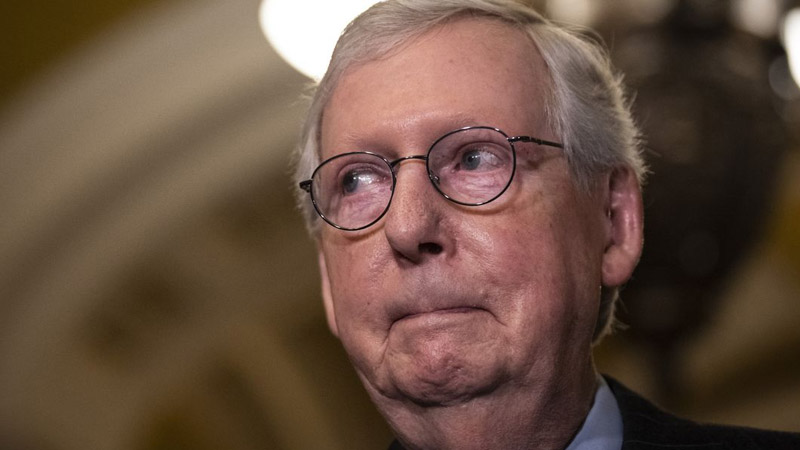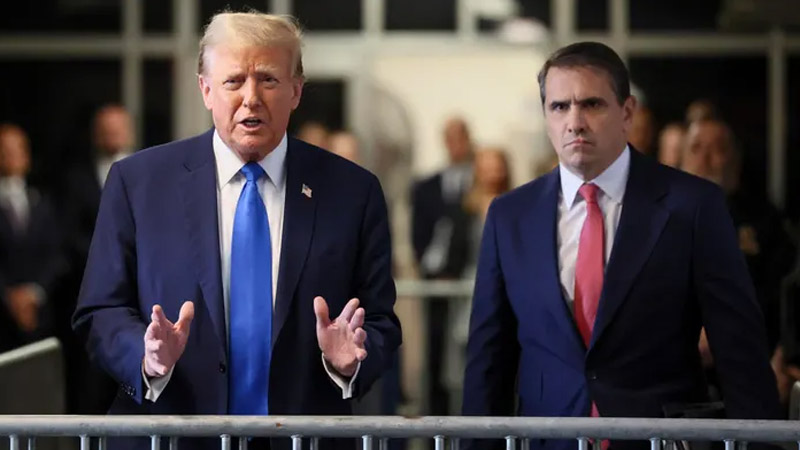GOP Senate Leadership Cautious About Election Prospects with Trump Likely at the Helm Again

Drew Angerer/Getty Images
As the November elections approach, the Republican leadership in the Senate, with Donald Trump potentially leading their ticket for the third consecutive time, is taking a cautious approach rather than forecasting the dominant “red wave” they previously anticipated in the last two national elections.
This shift in strategy reflects a more measured expectation of political gains, with hopes of acquiring a modest four Senate seats, rather than a sweeping transformation of the Senate’s composition. The recent perspective from Senate Minority Leader Mitch McConnell, as reported by Politico, underscores a strategic recalibration within the Republican ranks.
“It’s important to not get too excited because it’s noteworthy that in the last cycle, not a single incumbent lost. So what’s the message? Candidate quality,” McConnell elaborated. “It’s important to continue to say you want 51. There’s nothing wrong with getting more, but 51 gives you control. And I think that’s going to be really important, no matter who’s elected president.”
“If we come in with 51, it will have been a good day. If we come in with 52 it will have been a great day. Anything beyond that is sort of like going to a baseball game and hoping to see a triple play,” he explained.
McConnell, representing Kentucky, has been vocal about the need for the party to pivot towards more electable candidates if they are to overcome the setbacks experienced in the 2020 and 2022 elections. These past electoral challenges have been attributed in part to candidates endorsed by Donald Trump, whose influence has shaped the party’s direction but also brought about divisive outcomes.
Politico’s Burgess Everett pointed out that these electoral “debacles” have placed significant pressure on McConnell. The Minority Leader is keenly aware of the need to reverse the Republicans’ recent fortunes and is intent on leaving his successor with control of the Senate. McConnell’s tenure has seen missed opportunities, with the party failing to capitalize on winnable scenarios, a pattern he is desperate to alter.
Although McConnell is publicly not a supporter of Trump, he recognizes that a strong showing from the former president could potentially benefit the GOP’s chances in pivotal swing-state Senate races across Nevada, Arizona, Wisconsin, Pennsylvania, Michigan, and even Maryland. The interplay between Trump’s polarizing figure and the broader Republican strategy highlights the complex dynamics at play as the party seeks to navigate its internal divides and present a united front in critical electoral battlegrounds.
The Republican leadership’s strategy involves a careful balancing act: leveraging Trump’s popularity base to gain electoral advantages while managing the broader electoral implications of his involvement. This nuanced approach reflects McConnell’s pragmatic leadership style, aimed at achieving tangible gains in the Senate and improving the party’s legislative influence.
As the elections draw nearer, the stakes are high for the Republican Party to demonstrate it can surmount past challenges and make significant inroads in the Senate. The outcome will not only affect the legislative agenda but also set the tone for the party’s future direction in the post-Trump era. The GOP’s ability to adapt and respond to the electorate’s shifting sentiments will be crucial in determining their success in the upcoming electoral cycle and beyond.


